Garden Maintenance in Stockwell
Introduction to Garden Maintenance in Stockwell
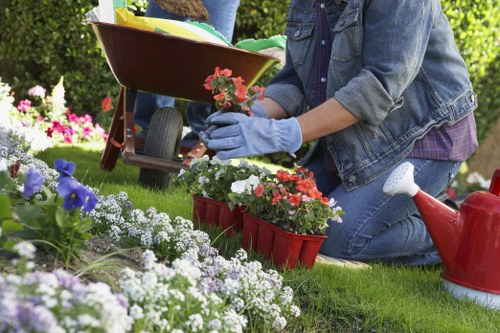
Maintaining a beautiful garden in Stockwell is both a rewarding and fulfilling endeavor. Whether you’re a seasoned gardener or just starting out, regular garden maintenance ensures that your outdoor space remains vibrant, healthy, and inviting throughout the year. With Stockwell’s unique climate and urban setting, understanding the specific needs of your garden is crucial for achieving optimal growth and aesthetics.
Garden maintenance involves a variety of tasks, from basic lawn care to more specialized activities like pruning, weeding, and sustainable practices. By staying on top of these tasks, you can prevent common issues such as pest infestations, plant diseases, and overgrowth, ensuring that your garden remains a picturesque haven in the heart of Stockwell.
Moreover, a well-maintained garden can significantly enhance the curb appeal of your home, provide a serene environment for relaxation, and even contribute to the local ecosystem by supporting pollinators and other beneficial wildlife. In this comprehensive guide, we will delve into the essential aspects of garden maintenance in Stockwell, offering practical tips and insights to help you cultivate a thriving garden all year round.
Importance of Regular Garden Maintenance
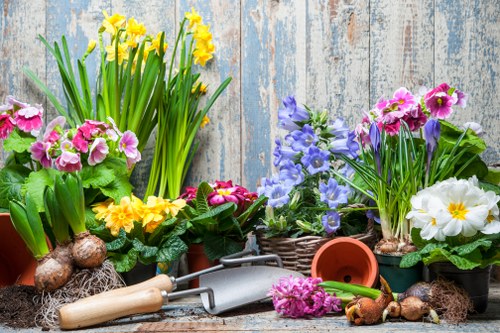
Regular garden maintenance is paramount for several reasons. Firstly, it ensures the health and longevity of your plants. By consistently monitoring and caring for your garden, you can identify and address issues before they escalate into serious problems. This proactive approach helps in maintaining the vitality of your plants, promoting robust growth, and preventing the spread of diseases.
Secondly, consistent maintenance enhances the aesthetic appeal of your garden. A well-tended garden, with neatly trimmed hedges, lush lawns, and vibrant flowers, creates a visually pleasing environment. This not only provides personal satisfaction but also increases the value of your property, making it more attractive to potential buyers should you ever decide to sell.
Furthermore, regular garden care supports environmental sustainability. Practices such as composting, mulching, and water-efficient irrigation contribute to soil health, reduce waste, and conserve water resources. By adopting these sustainable methods, you can create an eco-friendly garden that benefits both your immediate surroundings and the broader ecosystem.
Benefits of Maintaining Your Garden
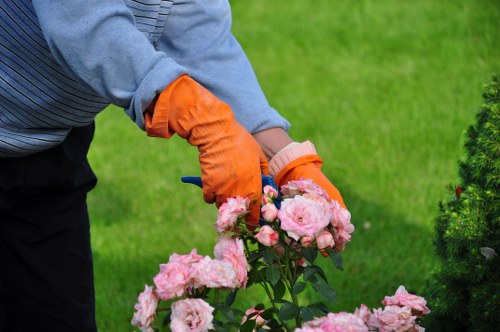
Maintaining your garden offers numerous benefits beyond mere aesthetics. One of the primary advantages is improved mental and physical well-being. Gardening is a therapeutic activity that reduces stress, enhances mood, and provides a sense of accomplishment. Engaging with nature in your own backyard can be a great way to unwind and boost your overall quality of life.
Another significant benefit is the promotion of biodiversity. A diverse garden attracts a variety of wildlife, including birds, bees, butterflies, and other pollinators. These creatures play a crucial role in the ecosystem, aiding in plant reproduction and controlling pest populations naturally. By fostering a biodiverse environment, you contribute to the health and balance of local flora and fauna.
Additionally, a well-maintained garden can be a source of fresh produce. Growing your own vegetables, herbs, and fruits allows you to enjoy fresh, organic produce right from your garden. This not only encourages healthier eating habits but also reduces your reliance on store-bought items, promoting sustainability and self-sufficiency.
Seasonal Garden Care in Stockwell
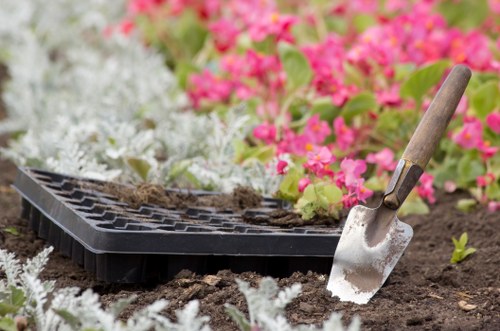
Spring Maintenance
Spring is a pivotal season for garden maintenance in Stockwell. As the weather warms up, it’s essential to prepare your garden for the upcoming growing season. Start by cleaning up any debris from the winter months, such as fallen leaves, dead plants, and mulch. This helps prevent the spread of diseases and pests that may have overwintered in your garden.
Next, consider soil preparation. Testing your soil’s pH levels and nutrient content can guide you in making necessary amendments. Adding compost or organic fertilizers enriches the soil, providing essential nutrients for your plants. Spring is also the ideal time to plant new flowers, vegetables, and shrubs, allowing them ample time to establish before the heat of summer sets in.
Don’t forget to prune trees and shrubs in the spring. Proper pruning helps shape your plants, promotes healthy growth, and removes any damaged or diseased branches. This not only enhances the appearance of your garden but also improves air circulation, reducing the risk of fungal infections.
Essential Garden Maintenance Tasks
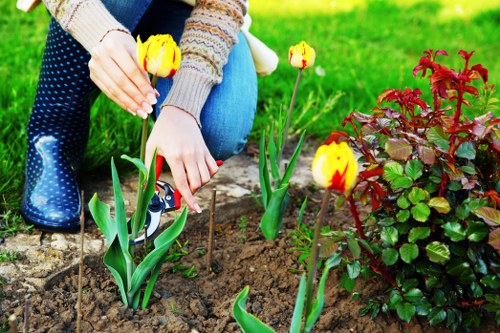
Lawn Care
A well-maintained lawn is the cornerstone of any beautiful garden. Regular mowing, watering, and fertilizing are essential to keep your grass healthy and green. Mow your lawn at the proper height to encourage deep root growth and prevent weeds from taking over. Water deeply but infrequently to promote drought resistance and reduce water waste.
Additionally, aerating your lawn in the spring and fall helps improve soil structure, allowing air, water, and nutrients to penetrate deeper into the soil. This practice enhances root development and overall lawn resilience. Applying a balanced fertilizer tailored to your grass type ensures that your lawn receives the necessary nutrients for optimal growth.
Don’t overlook the importance of weed control. Regularly removing weeds by hand or using eco-friendly herbicides prevents them from competing with your grass for resources. A thick, healthy lawn naturally suppresses weed growth, reducing the need for chemical interventions.
Pruning and Trimming
Pruning and trimming are crucial for maintaining the shape and health of your plants. Proper pruning removes dead or diseased branches, promotes air circulation, and encourages new growth. It also helps in controlling the size of your plants, preventing them from becoming overgrown and unruly.
When pruning, use clean and sharp tools to make precise cuts. This minimizes damage to the plants and reduces the risk of disease transmission. Different plants have specific pruning requirements, so it’s important to research the best practices for each type of plant in your garden.
Trimming hedges and bushes regularly ensures that they maintain their desired shape and size. This not only enhances the visual appeal but also allows light and air to reach the inner parts of the plants, promoting healthy growth.
Weeding and Mulching
Weeding is a fundamental aspect of garden maintenance. Weeds compete with your plants for water, nutrients, and light, often leading to stunted growth and poor plant health. Regular weeding, especially in the early stages of weed growth, helps keep your garden clean and your plants thriving.
Mulching is an effective strategy to suppress weed growth and conserve soil moisture. Applying a layer of organic mulch, such as wood chips or straw, around your plants helps retain moisture, regulate soil temperature, and add nutrients as it decomposes. Mulching also enhances the overall appearance of your garden, giving it a neat and well-organized look.
In addition to weed control, mulching improves soil structure and prevents erosion. It provides a protective barrier against harsh weather conditions, reducing soil compaction and promoting a healthier root system for your plants.
Choosing the Right Plants for Stockwell Gardens

Native vs Non-native Plants
Selecting the appropriate plants for your Stockwell garden is pivotal for ease of maintenance and garden success. Native plants are well-adapted to the local climate and soil conditions, making them more resilient and requiring less care compared to non-native varieties. They also support local wildlife, providing habitat and food sources for native pollinators and other beneficial insects.
Non-native plants can add diversity and unique aesthetic appeal to your garden. However, they may require more attention in terms of watering, fertilizing, and pest management. Before introducing non-native species, consider their adaptability to Stockwell’s environmental conditions and the potential impact on the local ecosystem.
Balancing native and non-native plants can create a vibrant and sustainable garden. Incorporate a mix of both to enjoy the benefits of each while ensuring your garden remains eco-friendly and low-maintenance.
Drought-resistant Varieties
With the increasing awareness of water conservation, drought-resistant plants have become a popular choice for gardens in Stockwell. These plants are adapted to thrive with minimal water, making them ideal for areas prone to dry spells or for gardeners looking to reduce their water usage.
Some excellent drought-resistant options include lavender, sedum, and ornamental grasses. These plants not only require less watering but also offer beautiful blooms and textures that enhance the visual appeal of your garden. Incorporating mulch around these plants further aids in retaining soil moisture and reducing evaporation.
In addition to individual plants, consider implementing xeriscaping principles in your garden design. This approach emphasizes the use of drought-tolerant plants, efficient irrigation systems, and soil amendments that enhance moisture retention, creating a sustainable and water-efficient garden landscape.
Sustainable Gardening Practices

Composting and Soil Health
Composting is a cornerstone of sustainable garden maintenance. By recycling kitchen scraps, yard waste, and other organic materials, you can create nutrient-rich compost that improves soil structure and fertility. Compost enhances the soil’s ability to retain moisture, promotes beneficial microbial activity, and reduces the need for chemical fertilizers.
Maintaining healthy soil is essential for robust plant growth. Incorporate organic matter regularly to replenish soil nutrients and foster a thriving root system. Practices such as crop rotation, cover cropping, and reducing soil disturbance further contribute to long-term soil health and sustainability.
Healthy soil acts as a foundation for a successful garden, supporting strong plant growth and resilience against pests and diseases. Investing time and effort into sustainable soil management practices pays dividends in the overall health and productivity of your garden.
Water Conservation Techniques
Effective water management is critical for sustainable garden maintenance in Stockwell. Implementing water conservation techniques not only reduces your environmental footprint but also lowers your utility bills. One of the most effective methods is installing an efficient irrigation system, such as drip irrigation or soaker hoses, which deliver water directly to the plant roots, minimizing evaporation and runoff.
Rainwater harvesting is another excellent strategy for conserving water. Collecting and storing rainwater for garden use reduces dependence on municipal water sources and provides a free, natural supply of moisture for your plants. Setting up rain barrels or a rainwater harvesting system can significantly enhance your garden’s water sustainability.
Additionally, grouping plants with similar water needs together, known as hydrozoning, ensures that each area of your garden receives the appropriate amount of water. This targeted approach prevents overwatering and underwatering, promoting healthy plant growth and efficient water use.
Hiring Professional Garden Maintenance Services

Benefits of Professional Services
While DIY garden maintenance can be fulfilling, hiring professional garden maintenance services in Stockwell offers numerous advantages. Professional gardeners have the expertise and experience to assess your garden’s specific needs and address issues effectively. They can provide tailored solutions that enhance plant health, optimize garden design, and ensure sustainable practices are followed.
Professionals also save you time and effort, handling tasks such as pruning, fertilizing, pest control, and irrigation system maintenance. This allows you to enjoy a beautiful garden without the physical strain and time commitment required for regular upkeep.
Moreover, professional services often come with warranties or guarantees, providing peace of mind that your garden is in capable hands. Investing in expert maintenance can lead to long-term savings by preventing costly plant replacements and extensive repairs down the line.
How to Choose the Right Service in Stockwell
Selecting the right garden maintenance service in Stockwell requires careful consideration. Start by researching local providers and reviewing their services, experience, and customer feedback. Look for companies that prioritize sustainable practices and have a strong understanding of the local climate and plant varieties.
Consider scheduling consultations with potential service providers to discuss your garden’s specific needs and expectations. This allows you to gauge their expertise and see if their approach aligns with your vision for your garden. Ask about their maintenance schedules, pricing structures, and any additional services they offer, such as landscape design or seasonal clean-ups.
Additionally, verify that the service provider is licensed and insured, ensuring that your garden is protected against any potential damages or accidents. A reputable company will be transparent about their credentials and willingly provide references from satisfied clients.
Conclusion
Effective garden maintenance in Stockwell is essential for cultivating a healthy, beautiful, and sustainable outdoor space. By understanding the unique requirements of your garden, implementing regular maintenance practices, and leveraging professional services when needed, you can enjoy a thriving garden all year round.
Whether you’re focused on lawn care, plant selection, or sustainable gardening techniques, each aspect plays a vital role in the overall success of your garden. Embrace these practices to create a serene and vibrant environment that enhances your home and supports the local ecosystem.
Contact us today to learn more about our garden maintenance services and how we can help you achieve the garden of your dreams in Stockwell. Book your service now and take the first step towards a more beautiful and sustainable garden.